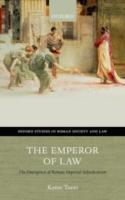
OUP (2016) 496pp £90 (ISBN 9780198744450)
Narratives woven from the prose and poetry of the ancient world shed new light on Rome and the idiosyncratic ruling styles of her emperors in T.’s fascinating survey of imperial judicial authority. By interrogating some of the most famous authors and cases of the period, T. has found a fresh and intriguing way of analysing the imperial interpretation of, and justification for, judicial power. It sometimes feels as if one is being drawn into the backstory of various Roman emperors’ quirky, individualistic styles. His examination of these ‘narratives’ is both compelling and attractive.
As all students of the period will know, direct source materials are, to say the least, few and far between. Instead, T. recounts his narratives of Roman life in law by drawing together materials from contemporary authors and historians and a plethora of other sources in a masterful and highly original feat of historical storytelling. In much the same way as a 21st-century judge would arrive at a clear and convincing decision based on the circumstantial evidence before them, so T.’s conclusions, after a survey of his sources, are cogent and persuasive.
Pro Ligario, Cicero’s brilliant oration in defence of Quintus Ligarius in 46 BC, forms the starting point for an analysis of Julius Caesar’s claims to judicial authority in the time of the late Roman republic. T. draws on Cicero’s narrative to demonstrate that Caesar came to judgement in an ad hoc fashion, using the typical judicial powers of a sole ruler. But more importantly, he shows how Cicero, ever the intelligent pragmatist, defended his client by playing on the principles of clementia (clemency and compassion) and pardon. Without these principles, Cicero advocated, Caesar would be viewed as a tyrant and a murderer no better than the general and dictator Sulla, by the very populace whose champion the emperor professed himself to be.
Cicero’s argument rested on the distinction between the judgement of a philosopher king or benevolent patriarch, and the actions of an unfettered tyrant acting without humanity. For the fiercely pro-republican philosopher, lawyer and political theorist, this must have been an uncomfortable plea to make. But his oration is also a moment of uncanny clairvoyance about the future of judicial sovereignty in Rome. To come was the usurpation of ultimate judicial authority by Caesar and the emperors who followed him. Yet in that moment, Cicero’s advocacy—as it usually did—moved his audience to tears, and Caesar had no choice but to acquit Ligarius.
The trial of Ligarius also prompted Cicero’s impassioned plea for one of the fundamental tenets of judicial administration. Cicero famously argued that the case should be heard, not at Caesar’s private home in camera, but in public. In doing so, he sowed the seed of the idea now expressed in the phrase, ‘justice should not only be done, but be seen to be done’. In Cicero’s day, access and public hearings were already regarded as crucial to political and legal culture, just as they are today.
T.’s analysis of the narratives of the day reveals that observers regarded Caesar less as a Hellenistic divine ruler or philosopher king and more as a classic Greek tyrant. Roman scholars understood the figure of the tyrant to be an accomplished military leader who enjoyed popular grassroots support as the friend of the people. They viewed Caesar as a true tyrant in this Aristotelian sense, fighting on behalf of the poor in a timeless class struggle against the aristocracy. In fact, the arguments T. presents have a resonance with modern events that makes his storyline and subject matter even more pertinent.
The author recounts many similar narratives taken from the whole Roman period, from Augustus to the Severan era, and uses them to dissect the expansion and implementation of imperial judicial authority. There are many fascinating nuggets to be found in his analysis. He examines Ovid’s Tristia and other contemporary sources to argue that during the reign of Augustus, perception became the ultimate reality as the emperor experimented with—and exploited—exceptions to the rules of judicial authority. He reviews in detail the Stoic philosophical influence on Hadrian’s contributions to the administration of justice. He also offers some interesting observations about the link the Roman jurist Ulpian made between law, justice and ius naturale (natural law), according to which all men are equal and should have protection under the law.
This reviewer found that The Emperor of Law was read most enjoyably at regular intervals rather than in one sitting. Needless to say, it is a book for the serious classicist and all those who have a passion for Roman law and the Roman Empire. Once again, OUP has not disappointed with a fine overall treatment of the textual and illustrative features of the book.
Frederick Mostert
